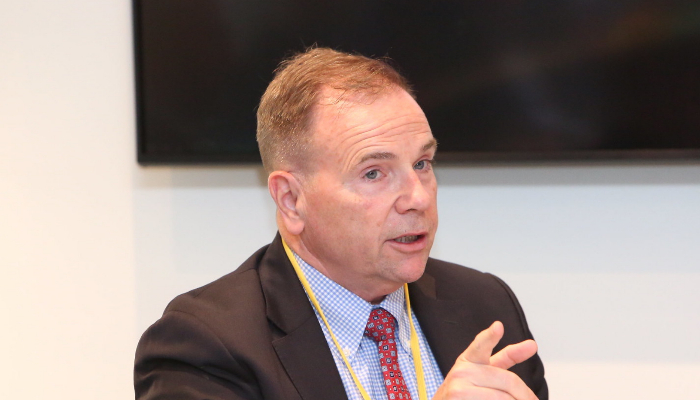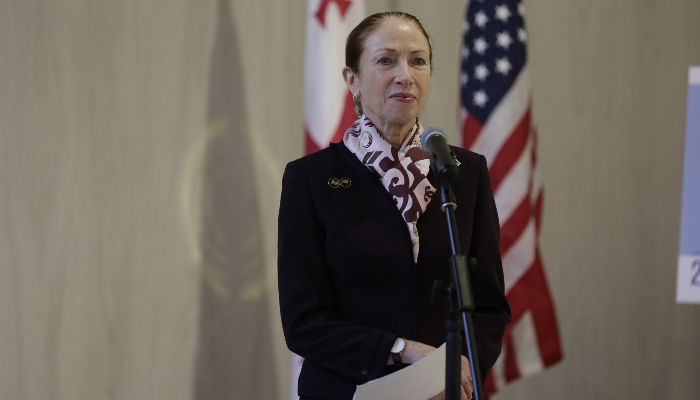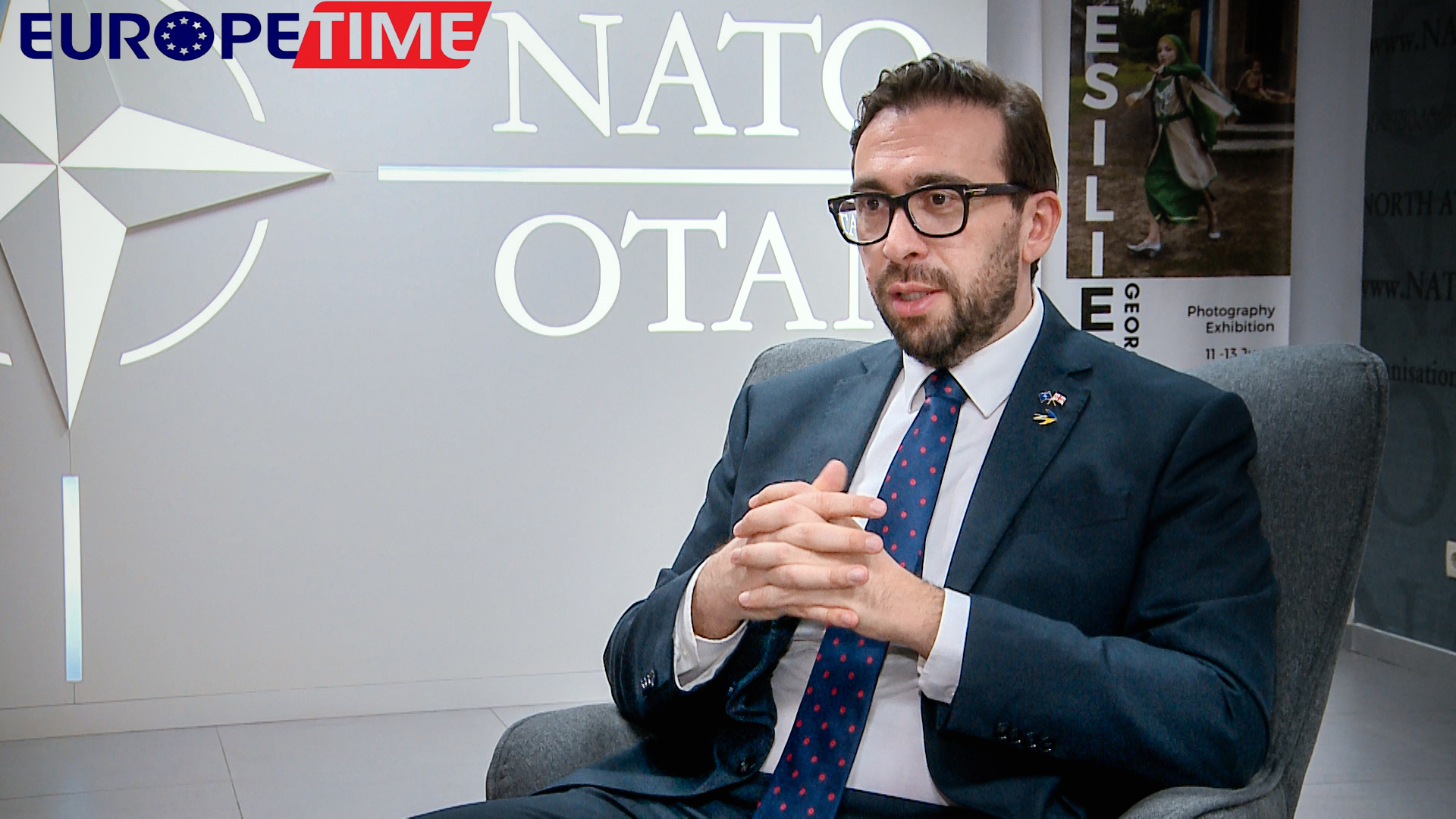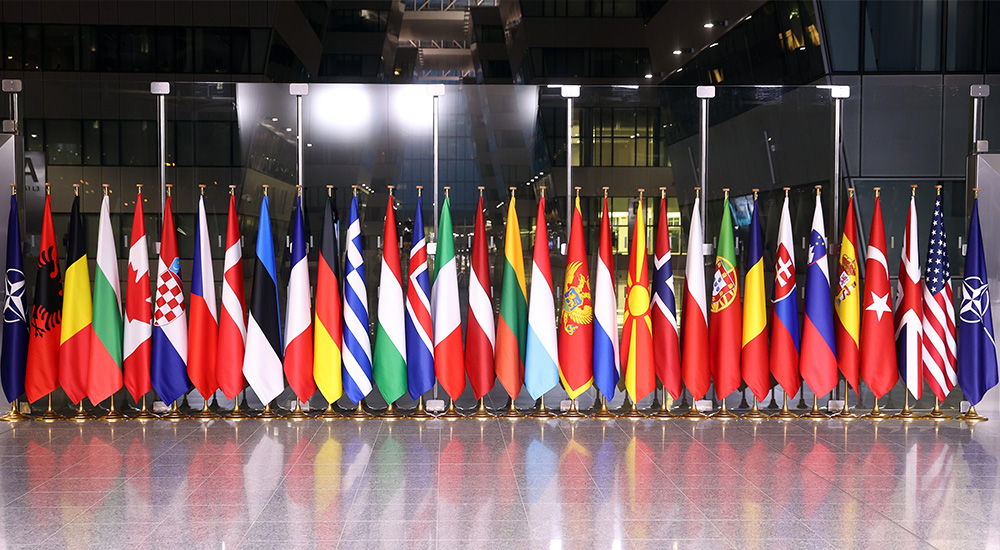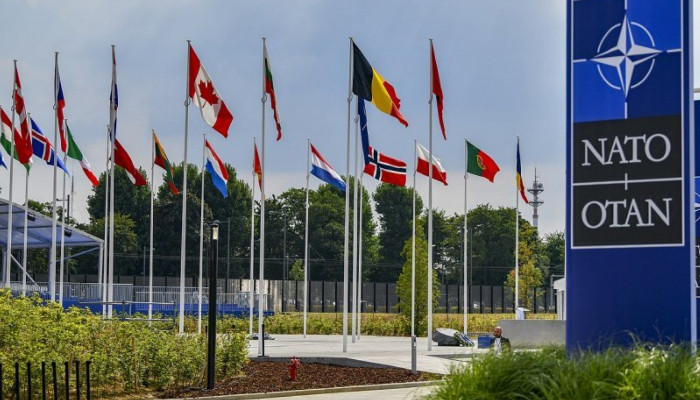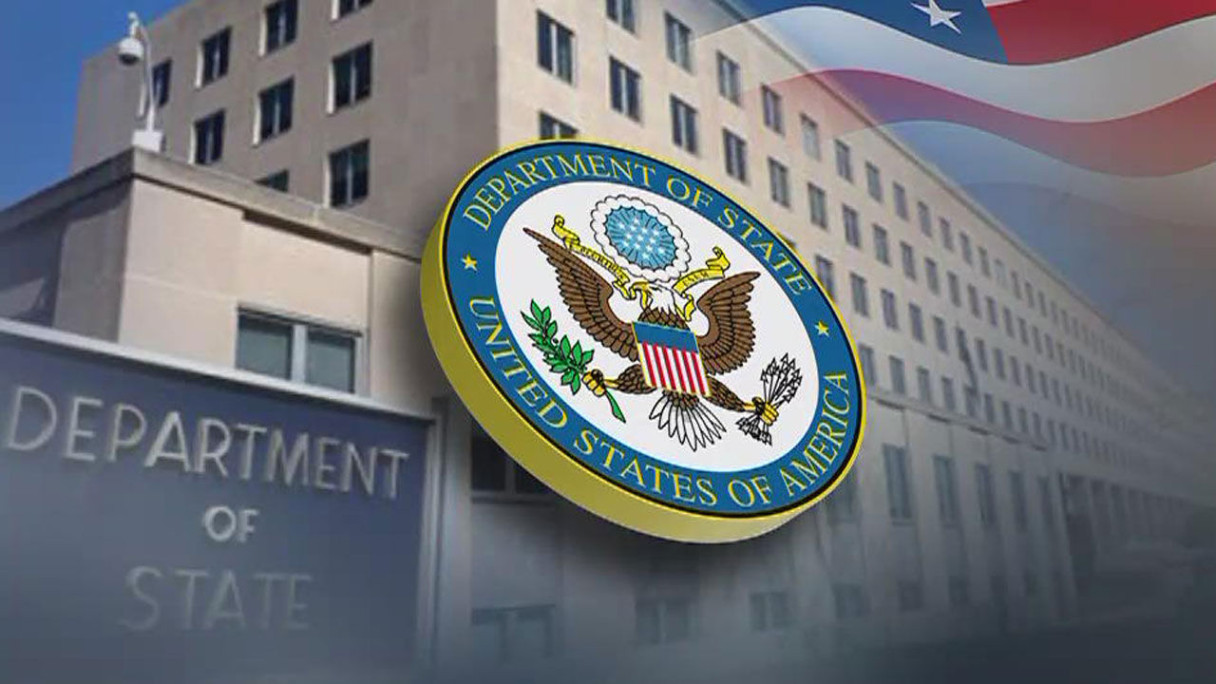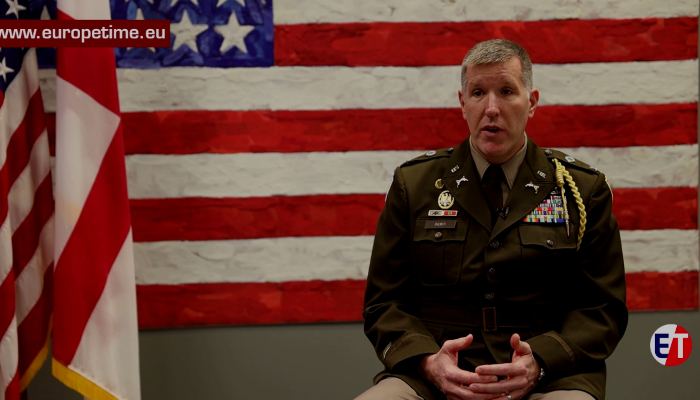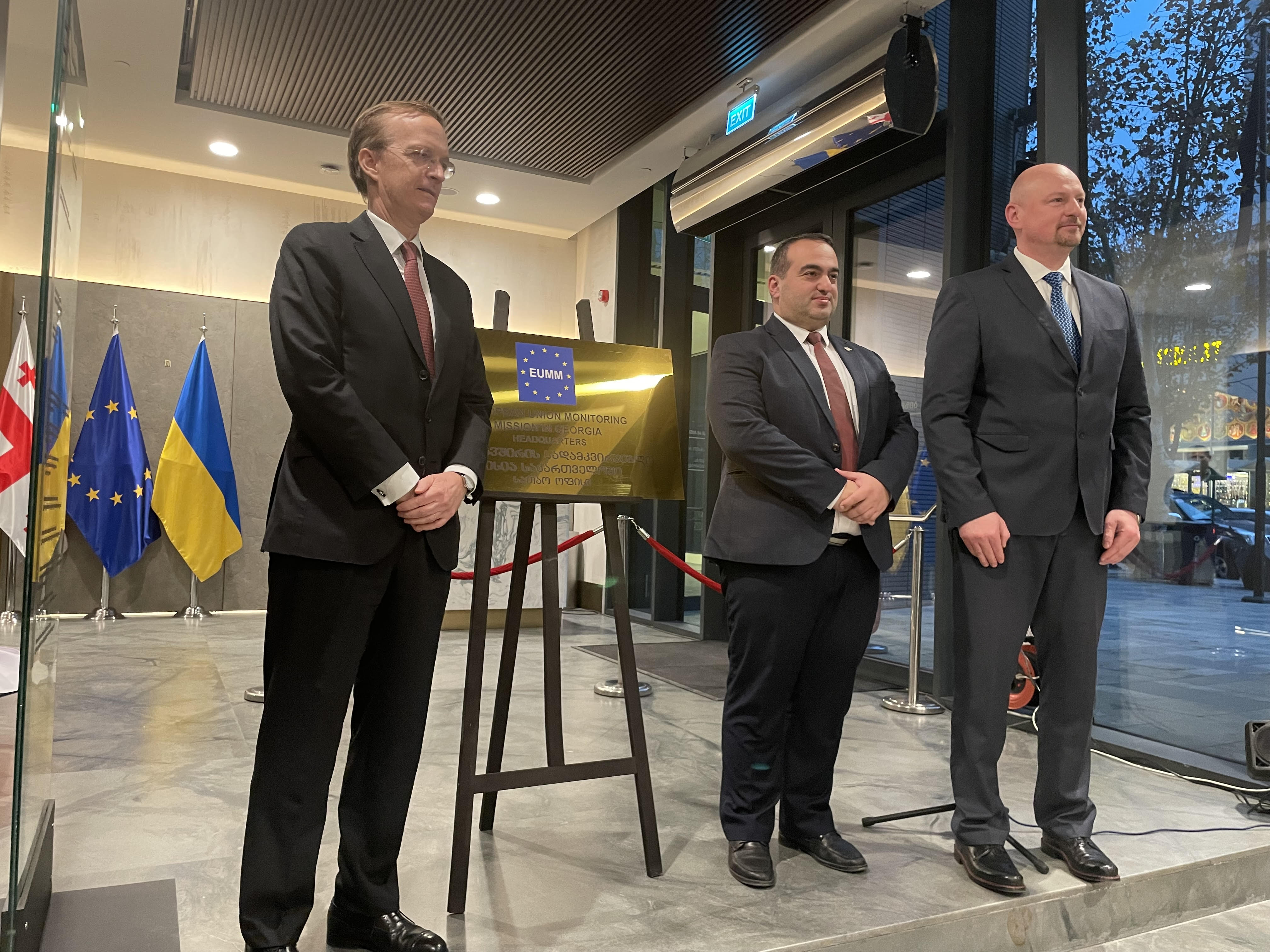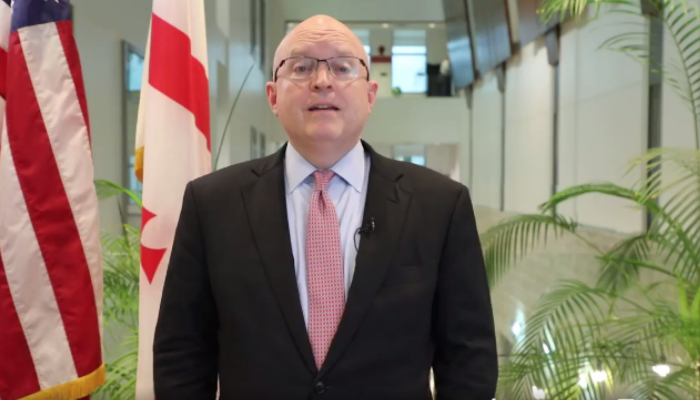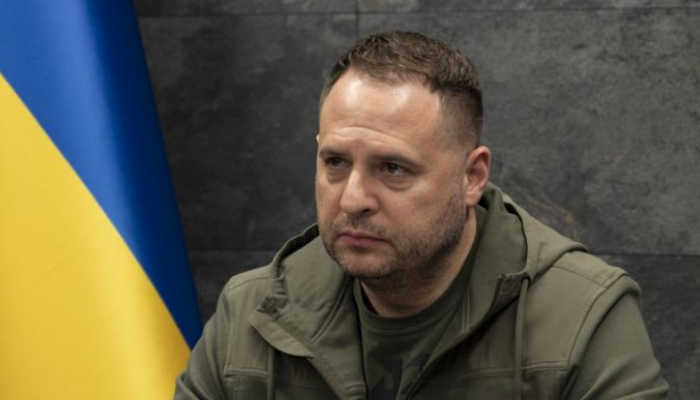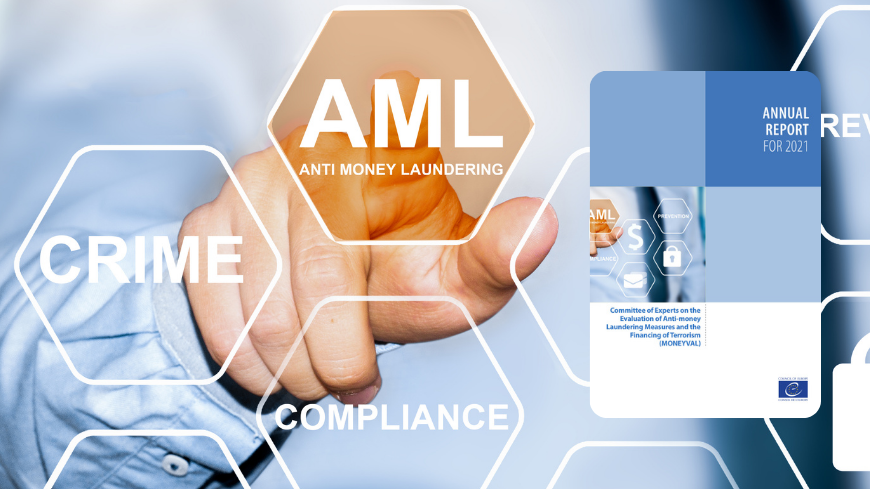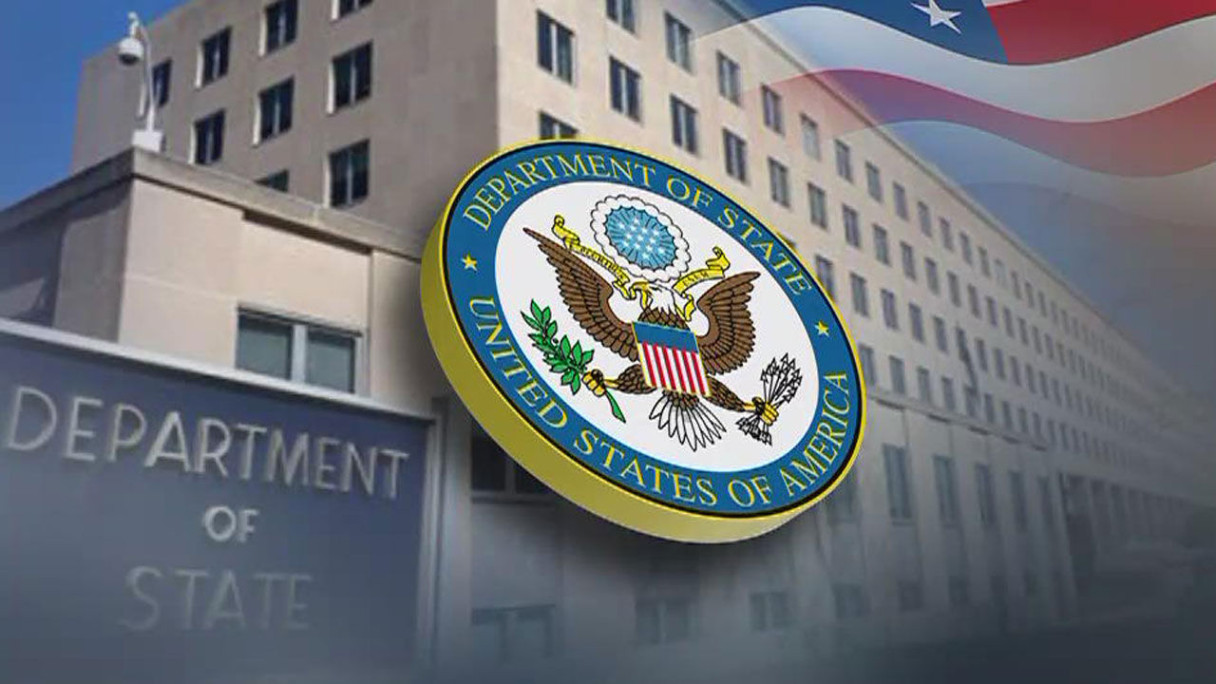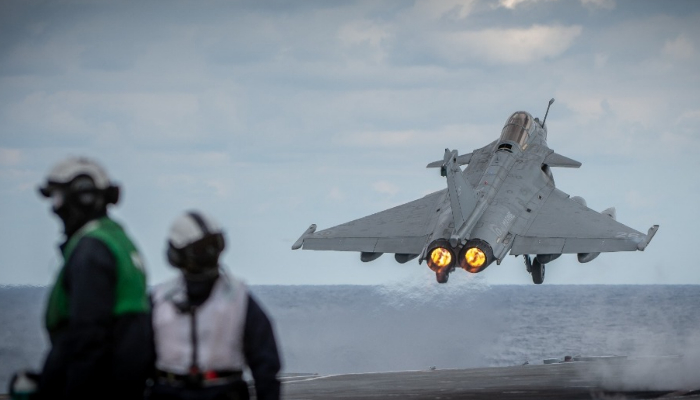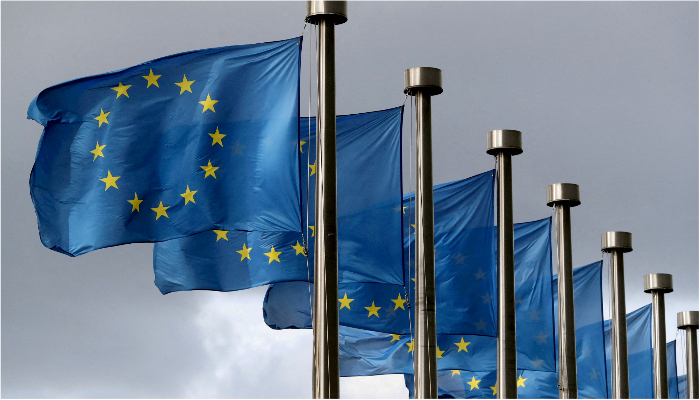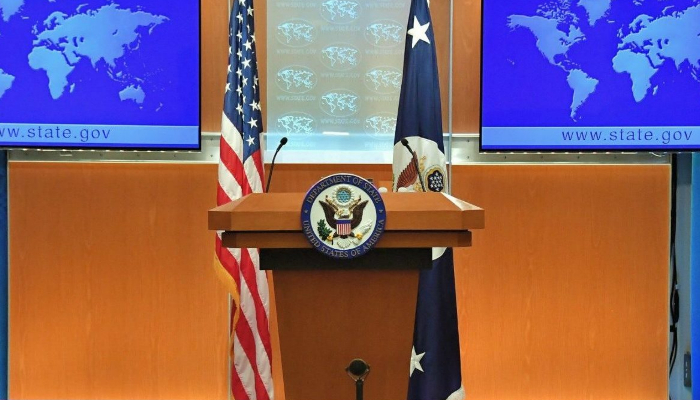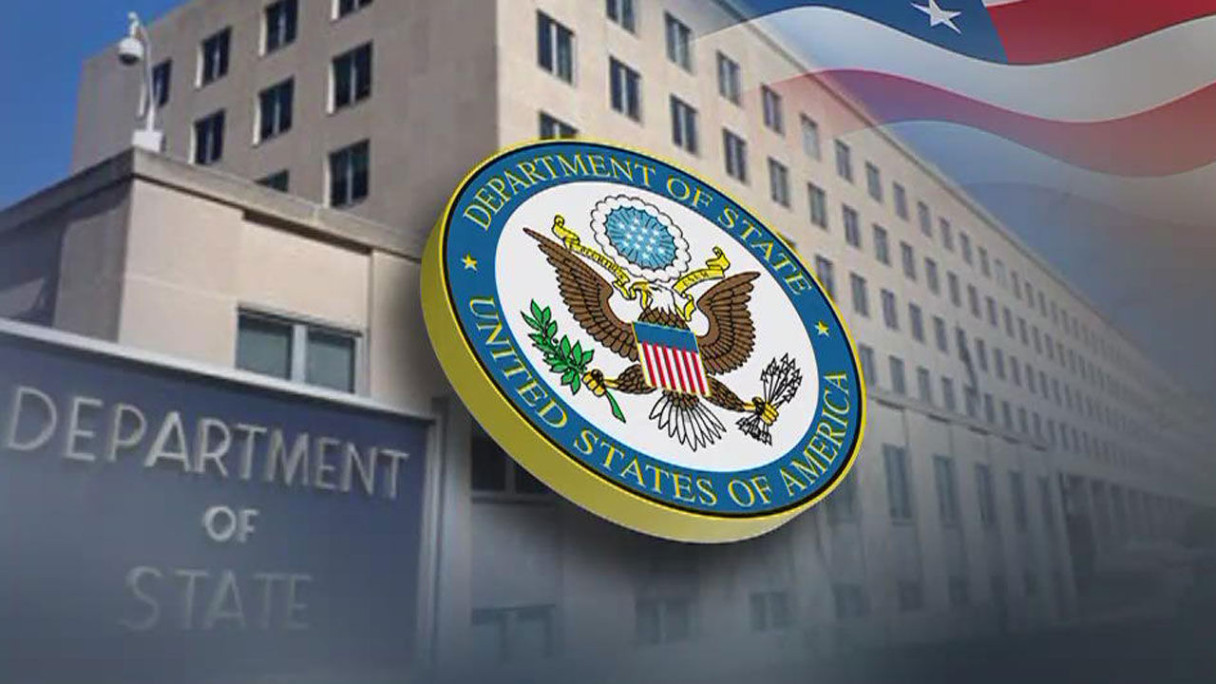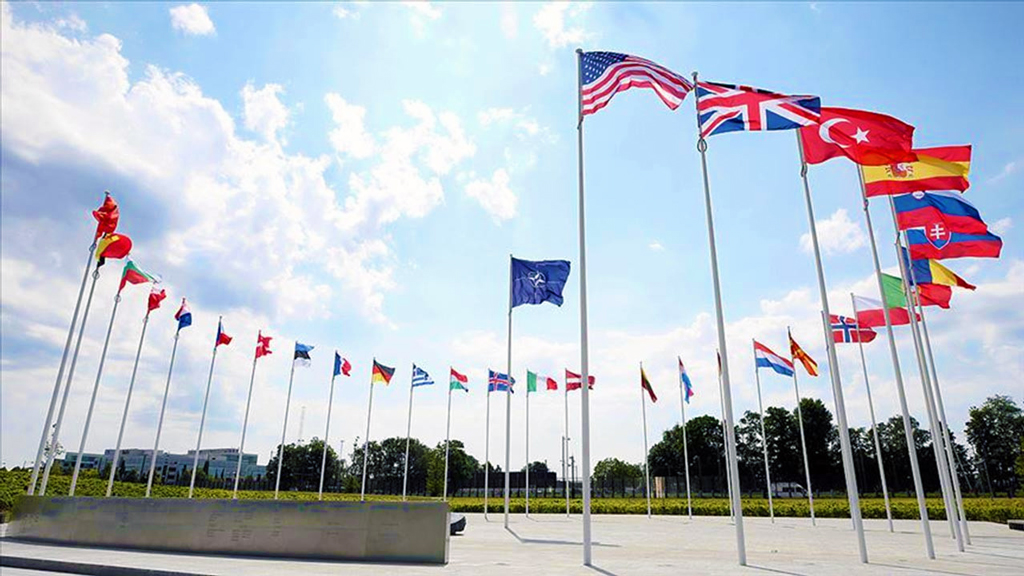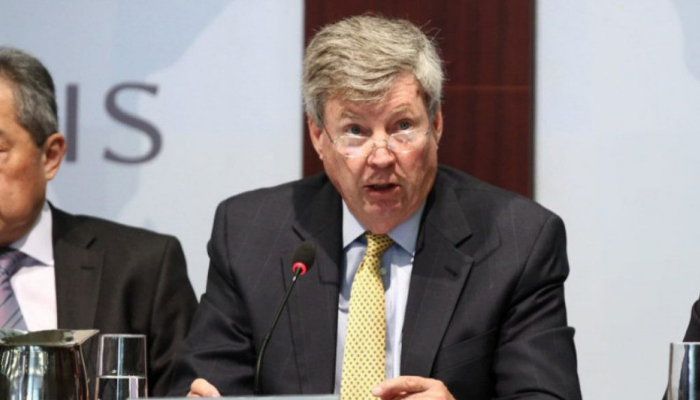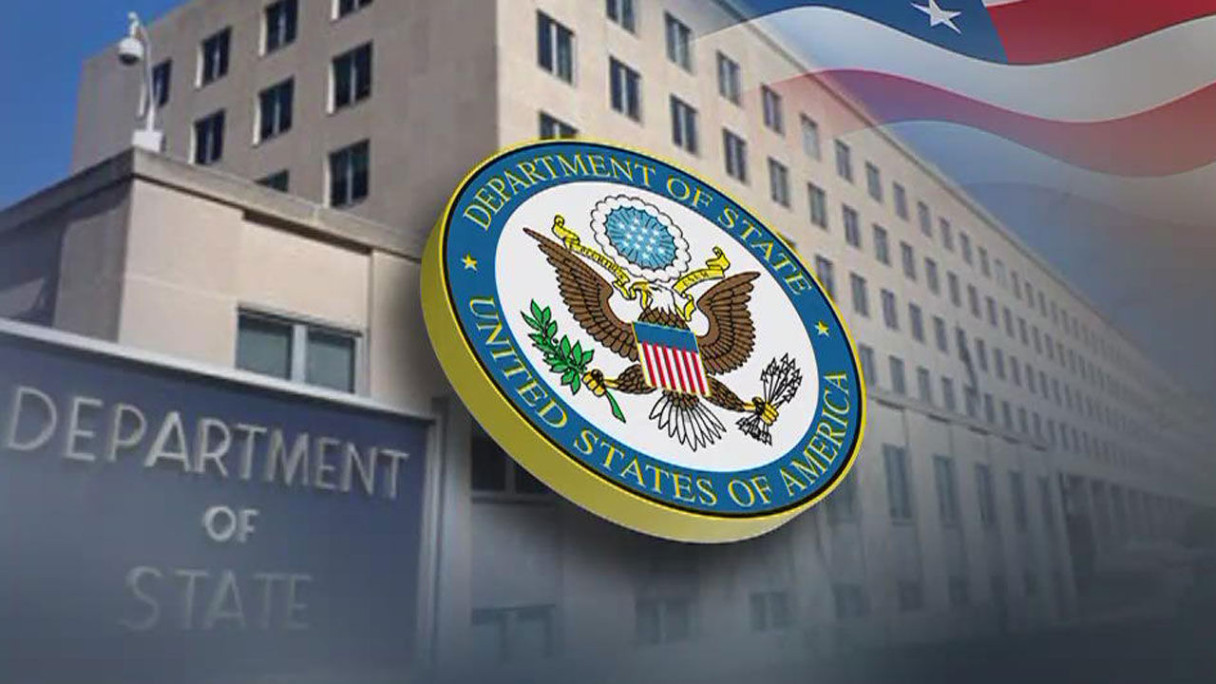news
Ben Hodges: The Anaklia deep-water port will be a key part of the US strategy for the larger Black Sea region
The former Commanding General of US Army Europe, Lieutenant General (retired) Ben Hodges, responded to Europetime's inquiries. We asked him to comment on the Georgian government's announcement that they can start immediate construction and port development by 2023. Also, on the necessity and significance of infrastructure projects for Georgia as well, which is given the chance to enhance and underline its role and function as a connecting link between Europe and Asia within the framework of the new geopolitical scenario. „Russia and Iran are building a transportation network of rivers, seas, and railroads to avoid sanctions while moving products between the two nations and beyond. Obviously, we’ve got to find ways to close all the loopholes through which Russia and Iran are able to violate the sanctions protocols. But there will be a day when Russia and Iran are not necessarily our enemies, so we should be thinking long-term about how to take advantage of this new trade route, and the soon-to-be-developed USG Strategy for the greater Black Sea region could take this into account. Building a deep-water port at Anaklia in Georgia would be a key part of this, enabling major traffic from the Black Sea region to get to the Caspian Sea via rail through GEO and AZE. Unfortunately, the current government of Georgia does not seem to grasp or favor this sort of strategic thinking and investment“, - Ben Hodges told Europetime. Early on, Ben Hodges told Europetime that the Biden Administration should announce a comprehensive strategy for the greater Black Sea region. Ambassador Degnan: We strongly support the development of the Anaklia deep water port Exclusive interview on Europetime with the US Defense Attaché Prime Minister Irakli Garibashvili revealed on 12 December that the long-awaited deep sea port of Anaklia will be built with the government’s participation, which will subsequently own 51% of it. The Prime Minister noted that an international competition will be announced to select the partners and companies which will participate in the project. „we strongly support the development of the Anaklia deep water port, which is critical infrastructure for Georgia to develop. It would be a huge contribution as Georgia develops its role in the Middle Corridor, to bring goods from Central Asia to Europe. Development of the port would also bring jobs to Georgia and the region. We hope to see the Government of Georgia move forward to tender the project and select a qualified developer through a transparent and competitive process“, - US Ambassador to Georgia Kelly Degnan told Europetime. In addition, NATO welcomes the development of infrastructure of strategic importance, such as the port facilities on the Black Sea coast. „We welcome all steps undertaken by the Georgian authorities to promote its economic development and security. According to a NATO official speaking to Europetime, this includes the development of infrastructure of strategic importance, such as the port facilities on the Black Sea coast. "The Anaklia Deep Sea Port is a great opportunity," said Philip Reeker, Acting Assistant Secretary of State for European and Eurasian Affairs, during a visit to Georgia in June 2021. Senator Rob Portman also stressed that it is extremely important that more countries invest in Georgia. „We should encourage more direct investment in Georgia. One would be infrastructure, specifically a particular port project, which is a huge opportunity for infrastructure investment. But also, there are so many other opportunities in agriculture and other commodities, including mining, including manufacturing,"-Senator Rob Portman said in an exclusive comment with Europetime.
Ambassador Degnan: We strongly support the development of the Anaklia deep water port
„we strongly support the development of the Anaklia deep water port, which is critical infrastructure for Georgia to develop. It would be a huge contribution as Georgia develops its role in the Middle Corridor, to bring goods from Central Asia to Europe. Development of the port would also bring jobs to Georgia and the region. We hope to see the Government of Georgia move forward to tender the project and select a qualified developer through a transparent and competitive process“, - US Ambassador to Georgia Kelly Degnan told Europetime. „Russia’s war against Ukraine has demonstrated the need for alternatives to the northern transit route through Russia, and the United States supports the development of the Middle Corridor to transport goods, energy, and data from Central Asia to Europe. To develop the Middle Corridor requires regional cooperation with the efficient integration of road, rail, and sea transportation infrastructure. The United States has long supported Georgia’s economic development and recognizes the key role Georgia can play in the Middle Corridor with its access to the Black Sea. Specifically, we strongly support the development of the Anaklia deep water port, which is critical infrastructure for Georgia to develop. It would be a huge contribution as Georgia develops its role in the Middle Corridor, to bring goods from Central Asia to Europe. Development of the port would also bring jobs to Georgia and the region. We hope to see the Government of Georgia move forward to tender the project and select a qualified developer through a transparent and competitive process. In addition, the Development Finance Corporation supported the expansion of the Pace Terminal at Poti Seaport through a $50 million loan. The terminal expansion, which opened in January 2022, more than doubled the cargo capacity for the terminal, an important step that moves Georgia closer to its goal of becoming an East-West trade hub. Trammo is another good example, a U.S. company which facilitates the transport of fertilizer from Uzbekistan and Kazakhstan. Looking forward, the US government is seeking new opportunities for partnership across the Middle Corridor. In Georgia, this means exploring new infrastructure investment opportunities, and increasing our economic development support to the transport and logistics sectors to increase efficiency and value of goods being shipped from and through Georgia. These investments and partnerships will result in greater global economic integration for Georgia, and more lucrative employment opportunities for Georgians. As always, we are working closely with the citizens of Georgia, the government, and the business community to help ensure Georgia is ready to take full advantage of this opportunity. For example, we stand ready to assist the Georgian government in their path towards greater adoption of international standards for road safety, and to assist Georgian producers with the resources and skills necessary to compete fairly on the global market. In summary, the USG sees the increased interest in developing the Middle Corridor as a substantial opportunity for Georgia’s path towards a prosperous, democratic, globally integrated future“, - Kelly Degnan told Europetime. Prime Minister Irakli Garibashvili revealed on 12 December that the long-awaited deep sea port of Anaklia will be built with the government’s participation, which will subsequently own 51% of it. The Prime Minister noted that an international competition will be announced to select the partners and companies which will participate in the project. NATO: We welcome the development of infrastructure of strategic importance, such as the port facilities on the Black Sea coast
Alexander Vinnikov: Georgia should now concentrate on preparing for NATO membership
EuropeTime provides an exclusive interview with the head of the NATO Liaison Office in Georgia, Alexander Vinnikov. ET: Considering NATO-Georgia partnership, how do you assess the outcomes Georgia has achieved regarding taking advantage of the support provided to it by the Alliance?Alexander Vinnikov: Georgia is one of NATO’s closest partners. It aspires to join the Alliance. Over time, a broad range of practical cooperation has developed between NATO and Georgia, which supports Georgia’s reform efforts and its goal of Euro-Atlantic integration. Georgia has carried out an impressive range of reforms, particularly when it comes to its defense forces and the wider security sector. However, more needs to be done. I would highlight the issue of democratic oversight of the institutions of the security sector. There’s still more that should be done to align the Georgian system with the principles of NATO member states. Other key reform areas where Allies would like to see progress include judiciary reform, electoral reform, and freedom of the media. Progress in all of these areas would be greatly facilitated by a less polarized political environment. We encourage Georgia to recover the momentum of its reforms, something that has been reduced in the last couple of years. The European perspective granted to Georgia by the EU represents an historic window of opportunity to take forward ambitious reforms. There is significant overlap between the EU’s 12 recommendations and NATO’s recommendations provided through the ANP process. Allies encourage both the government and the opposition to seize this opportunity and reach across the political divide to advance the country on its constitutionally mandated European and Euro-Atlantic path. At the Madrid Summit, Allies made decisions to strengthen the resilience of those partners we consider most at risk of further Russian threats and interference in the context of Russia’s unprovoked and brutal invasion of Ukraine. Georgia is one of these partners. Allied leaders decided to step up their political and practical support to Georgia, and these decisions are already being implemented. Furthermore, at their most recent meeting in Bucharest (November 29–30), NATO Foreign Ministers reaffirmed the Alliance’s support for Georgia in very strong terms. The Statement by Foreign Ministers underscores the Alliance’s firm commitment to its "Open Door" policy and reaffirms the decisions the Allies took at the 2008 Bucharest Summit and all subsequent decisions with respect to Georgia and Ukraine. Georgia’s E-A aspirations are also reflected in the new Strategic Concept (NATO’s second most important document after the Washington Treaty) adopted at the Madrid Summit. ET: The war against Ukraine has led to increasing of attention towards the Black Sea security. In your view, how important is it to have a fresh coordinated, common strategy towards the Black Sea region and is US discussing this issue with NATO? Alexander Vinnikov: Since 2014, we have implemented the largest reinforcement of our collective defense in a generation, enhancing our ability to defend allies on land, at sea, in the air, in cyberspace, and in space. This adaptation continues, and NATO is stepping up in response to the threats and challenges of today and tomorrow.NATO has a responsibility to prevent the conflict from escalating beyond Ukraine. We have significantly strengthened our defenses in the eastern part of the Alliance, with 40,000 troops under NATO command, hundreds of ships and planes, and eight multinational battlegroups from the Baltic to the Black Sea.NATO’s Strategic Concept endorsed at the 2022 Madrid Summit recognises that the Black Sea is an area of strategic importance not only for the NATO littoral states (Türkiye, Bulgaria and Romania), but for the Alliance as a whole. We have already increased our presence in the Black Sea region since 2014, following Russia’s illegal and illegitimate annexation of Crimea. with more ships, more aircraft, more information exchange, and a multinational battlegroup based in Romania. We are working even more closely with two other Black Sea nations, Georgia and Ukraine, two close partners. We did that before Russia launched its full-scale invasion of Ukraine, and we are committed to doing even more. We will continue to support the Euro-Atlantic aspirations of interested countries in these regions. We will enhance efforts to bolster their capabilities to address the distinct threats and challenges they face and boost their resilience against malign third-party interference and coercion. ET: On 10-11 November, NATO Partnership and Cooperative Security Committee paid a two-day visit to Georgia. Can you tell us a bit more about this visit and whether there have been made any specific decisions? Do we have to expect high level visits in the nearest future?Alexander Vinnikov: Delegates of the PCSC were very satisfied with the visit to Georgia. Due to the wide range of scheduled meetings with various key institutions (MoD, MoI, NSCO, SSSG, MFA, Parliament, the Public Defender’s Office), parliamentary opposition, and civil society, the delegation had the chance to acquire a comprehensive picture of the situation in Georgia. The delegates were also able to visit the ABL at Odzisi. NATO-Georgia cooperation and Georgia’s Euro-Atlantic integration were integral parts of all discussions. The 12 EU recommendations, Russia’s unprovoked invasion of Ukraine, and Black Sea security were also widely discussed. Although the views of the Georgian authorities, opposition, and civil society might differ from each other, all interlocutors unanimously agreed on the importance of Euro-Atlantic integration and of Georgia’s eventual accession to NATO. This visit was part of the political support envisioned by the tailored support measures adopted for Georgia at the Madrid Summit. We do expect our close, high-level political dialogue to continue very actively in the coming year as well. ET: After adopting the tailored support package for Georgia on the Madrid Summit, the Alliance has often spoken about strengthening relations with its partners. The last example of this is the Bucharest Summit. This decision (strengthening support taking into account the threats) has been made by NATO in the face of Russia’s war in Ukraine. Considering this, can we say that the process of Georgia’s integration into the Alliance has been accelerated more quickly than it had been provisioned before the war?Alexander Vinnikov: At the Bucharest Summit in 2008, allied heads of state and government decided that Georgia would be a member of NATO in the future. Now it’s important for Georgia to focus on getting ready for membership. It is not just the MoD or armed forces that join NATO; it is the entire country. That is why it is necessary to implement a wide range of democratic reforms. As I said, particularly critical are reforms in the areas of the rule of law, electoral reforms, and freedom of the media, as well as the further transformation of Georgia’s security and defense sectors. Georgia has a key instrument to get closer to NATO: the Annual National Program. An assessment team recently visited Tbilisi, and Allies will soon provide consolidated feedback and advice to Georgia with regard to the implementation of its ambitious reform agenda. It’s important to note that NATO continues to provide very close political and practical support for all of those efforts, and as you note, this support was further enhanced at the Madrid Summit. We are now in the process of implementing those decisions. ET: The NATO Liaison Office in Georgia has a regional mandate, also covering Armenia and Azerbaijan. You went on missions to Armenia and Azerbaijan. How do you assess the results of your visit? NATO values its partnership with these countries, both of which have contributed to Euro-Atlantic security for many years. This year I paid several visits to both Yerevan and Baku in order to take forward our political dialogue and practical cooperation with both partners. Most recently, I visited Armenia in October and held meetings with Armenia’s Acting Minister of Foreign Affairs, the Secretary of the National Security Council, the Head of the Ministry of Defense's Defense Policy and International Co-operation Department, as well as with the Human Rights Defender (Ombudsperson). During the meetings, we discussed issues related to NATO-Armenia relations and cooperation and the prospects for their further development, and we also exchanged views on regional security issues of mutual interest. In November, together with our NATO Military Liaison Officer and Political Officer, we visited Baku. We held a meeting at the Republic of Azerbaijan’s Ministry of Foreign Affairs and discussed issues related to NATO-Azerbaijan dialogue and cooperation, as well as exchanging views on regional security topics of mutual interest. In Baku, I also delivered a speech at the High-Level Conference on Women, Peace, and Security, "Women for Sustainable Tomorrow," held at ADA University, and met with resident NATO Ambassadors and Heads of Mission of other international organizations accredited in Baku. On the military side, Col. Abidinoglu, our NATO Military Liaison Officer, also participated in the annual "NATO Days" in Azerbaijan, organized by NATO military authorities, which included engagements with Azerbaijan’s National Defense University and with the Land Forces’ and Naval Forces’ OCC units. As part of my mandate, I will continue regular working visits to Armenia and Azerbaijan and will also continue to support the high-level engagement of Javier Colomina, the NATO Secretary General’s Special Representative for the Caucasus and Central Asia.
NATO: We welcome the development of infrastructure of strategic importance, such as the port facilities on the Black Sea coast
„We welcome all steps undertaken by the Georgian authorities to promote its economic development and security. According to a NATO official speaking to Europetime, this includes the development of infrastructure of strategic importance, such as the port facilities on the Black Sea coast. „NATO’s partnership with Georgia is on a solid track. The foreign ministers of Georgia, Bosnia and Herzegovina and Moldova attended the meeting of NATO Foreign Ministers in Bucharest at the end of November. These three countries are facing Russian pressure and NATO is committed to do even more to help strengthen their resilience and capabilities to defend themselves. For Georgia, we are committed to increasing our support by building on the Substantial NATO-Georgia Package, including in the areas of situational awareness, secure communications, resilience and cyber, as well as by helping Georgia to develop its own cyber capabilities and by providing additional personnel to the NATO Liaison Office in Georgia“, a NATO official told Europetime. Prime Minister Irakli Garibashvili revealed on 12 December that the long-awaited deep sea port of Anaklia will be built with the government’s participation, which will subsequently own 51% of it. The Prime Minister noted that an international competition will be announced to select the partners and companies which will participate in the project.
NATO: We welcome all steps undertaken by the Georgian authorities to promote its economic development and security. Putin’s energy leverage is weakening
`We welcome all steps undertaken by the Georgian authorities to promote its economic development and security. This includes the development of infrastructure of strategic importance, such as the port facilities on the Black Sea coast“, - According to a NATO official speaking to Europetime, NATO’s partnership with Georgia is on a solid track. „I can add the following. NATO’s partnership with Georgia is on a solid track. The foreign ministers of Georgia, Bosnia and Herzegovina and Moldova attended the meeting of NATO Foreign Ministers in Bucharest at the end of November. These three countries are facing Russian pressure and NATO is committed to do even more to help strengthen their resilience and capabilities to defend themselves. For Georgia, we are committed to increasing our support by building on the Substantial NATO-Georgia Package, including in the areas of situational awareness, secure communications, resilience and cyber, as well as by helping Georgia to develop its own cyber capabilities and by providing additional personnel to the NATO Liaison Office in Georgia. Furthermore, for too long, Europeans have been dependent on Russian oil and gas. Russia has weaponised energy and tried to use it to blackmail us, and prevent us from supporting Ukraine, but President Putin has not succeeded. Allies are taking extraordinary steps to decrease energy use and diversify energy supplies. Storage sites for gas in Europe are at capacity. Allies are securing liquefied natural gas contracts, prolonging nuclear reactors and restarting coal-fired plants. Russia now provides less than 10 percent of Europe’s gas, down from 45 percent before the war. This represent a buffer against further cut-offs of Russian supplies or other shocks. The G7 also agreed to cap the price for Russian oil, further limiting the revenues that fund the Kremlin's war, and Allies will continue to invest in stable and reliable energy supply, suppliers, and sources. So President Putin’s energy leverage is weakening“, - a NATO official told Europetime. The leaders of Azerbaijan, Georgia, Hungary, and Romania signed an agreement in Bucharest on Saturday to build an underwater electric cable under the Black Sea. The project could become a new power source for the European Union as the bloc seeks to reduce its reliance on Russian energy. "Since the beginning of the Russian war, we have decided to abandon Russian fossil fuel and diversify our options towards reliable partners in the energy field, such as those present at this table. And it is working," said Ursula von der Leyen, president of the European Commission. The 1,100-kilometer cable from Azerbaijan to Romania will provide Azeri energy for the rest of the continent. It will also benefit Moldovans and Ukrainians, who have seen their energy security compromised by Russia's supply cuts and the bombing of critical infrastructure. The project could be completed within three to four years. As explained by Azerbaijani President Ilham Aliyev, the Asian country currently produces 27 gigawatts of wind and solar power and is developing projects that should increase this capacity by 4 gigawatts by the end of 2027. "It is a step towards creating a corridor for green energy," said the president of the natural gas-extracting country.
The US supports the Black Sea electricity project
The United States supports the December 17 Memorandum of Understanding signed between the leaders of Georgia, Azerbaijan, Romania, and Hungary for the development of a 1,100-kilometer subsea electricity cable to transport clean energy from the South Caucasus to the European Union via the Black Sea. a State Department spokesperson told Europetime. „As the President of the European Commission Ursula von der Leyen said during her address at the signing ceremony, the agreement will “bring the European Union closer to our partners in the South Caucasus region, and it will help both regions achieve the clean energy transition.” We also look forward to the results of the World Bank feasibility study that is now ongoing. On Georgia’s role in the project, we refer you to the Government of Georgia“, - a State Department spokesperson told Europetime. The leaders of Azerbaijan, Georgia, Hungary, and Romania signed an agreement in Bucharest on Saturday to build an underwater electric cable under the Black Sea. The project could become a new power source for the European Union as the bloc seeks to reduce its reliance on Russian energy. "Since the beginning of the Russian war, we have decided to abandon Russian fossil fuel and diversify our options towards reliable partners in the energy field, such as those present at this table. And it is working," said Ursula von der Leyen, president of the European Commission. The 1,100-kilometer cable from Azerbaijan to Romania will provide Azeri energy for the rest of the continent. It will also benefit Moldovans and Ukrainians, who have seen their energy security compromised by Russia's supply cuts and the bombing of critical infrastructure. The project could be completed within three to four years. As explained by Azerbaijani President Ilham Aliyev, the Asian country currently produces 27 gigawatts of wind and solar power and is developing projects that should increase this capacity by 4 gigawatts by the end of 2027. "It is a step towards creating a corridor for green energy," said the president of the natural gas-extracting country.
Exclusive interview on Europetime with the US Defense Attaché
EuropeTime provides an exclusive interview with the US Defense Attaché in Georgia, Colonel Joseph Bilbo. ET: How do you assess Georgia’s achievements since regaining independence as a function of USG assistance? Colonel Bilbo: I had the fortunate opportunity to come to Georgia for the first time in 2009, and since then, I've come back and forth to Georgia multiple times. Each time I saw development in Georgia, whether it was the development of the cities of Tbilisi or Batumi in terms of commerce or the products that were available, a lot of that was the result of the work of the Georgian people and the Georgian government. A lot of that comes as assistance from the United States. The United States has more than 30 offices and agencies here in the embassy that provide assistance to Georgia. But the assistance that used to be provided, the basic humanitarian type of assistance, is no longer part of what the Georgian people need because Georgia has developed beyond that. I think that one of the things that the Georgian people should be proud of is that the assistance that they receive now is a partnership through which we work together to build stronger markets, better and new access to markets, and stronger democratic principles like the rule of law, which invite greater economic development. ET: Do you think that rule of law is a problem in Georgia? Colonel Bilbo: I think rule of law is a challenge in many countries. Rule of law is a challenge because it's hard and it takes constant work. We all know that law is constantly being challenged in the United States, and the courts play an extremely important role in this regard. ET: The Georgia Defense and Deterrence Enhancement Initiative (GDDEI) is an important component of defense cooperation between the two countries. Against the background of the ongoing war in Ukraine and given the possible threats, as part of this initiative, are there any programs that have been adjusted or accelerated? Colonel Bilbo: "Jedi" is an evolution of the previous program, the Georgia Defense Readiness Program. It shows the continual development of the partnership in the Georgian Defense Forces. The program is focused on two aspects: many institutional changes at the ministerial level, including regulations and policies; and then engagement with the Defense Forces on building resilience and resistance capabilities within the Georgian Defense Forces and in Georgia's society. Unfortunately, what we see in Ukraine is that it remains a very relevant aspect of a national defense plan. I wouldn't say that anything has been pushed to go faster because it was already going quite fast. The adoption of these principles within Georgia, just in the last two years, has been quite impressive and continues today. ET: Everybody agrees that regional stability has rarely been in more danger or been more important than it is now. Should the issue of Ukraine be considered more broadly in the context of Russia's ambitions to influence the territories of other countries, including Georgia, and how do you see the role of the United States as Georgia's strategic partner from this point of view? Colonel Bilbo: I think Georgia is in a very difficult neighborhood, and it is not uncommon to see instability in this neighborhood. I don't think you have to go back that far; in fact, the nineties saw multiple wars in Georgia and the Karabakh War south of here. Despite being occupied by Russia for 20% of the time, there is some relative stability. A lot of that has to do with the development of deterrence capability. That's what the United States is partnering with the Georgian Defense Forces to do, which is to build a defensive capability that is a deterrent to any aggressor state. Unfortunately, we see in Ukraine Russia's continued willingness to use force to break international norms in an attempt to seize territory. It was blatant. They claimed territory in Ukraine much in the same way that Georgia’s territory was invaded and remains occupied. So, we are here to support Georgia’s defense and deterrence and ensure that it remains within its internationally recognized borders. I think Georgians know already that Russia is an occupier. Russia continues to keep troops on your territory, not because they were invited here but because they invaded. I think that Georgia understands that geography is not going to change, and Georgia is not interested in, nor does the US support, any type of aggressive activity to resolve that conflict. The U.S. participates in the Geneva International Discussions to try to resolve the conflict and force Russia to comply with the ceasefire agreement, but I think Georgians are very aware of the reality of Russian intentions inside of Georgia. ET: The war against Ukraine has led to increasing of attention towards the Black Sea security. The Black Sea region is one of the most strategically important for the United States. How important is a coordinated US strategy for the Black Sea region now? Colonel Bilbo: Strategy inherently needs to be coordinated to be effective. You're absolutely right that the Black Sea has continued to grow in importance. There's much talk among many countries about the development of a middle corridor. The United States absolutely supports this idea with our European allies. I believe that now, when you look at the Black Sea, when you have a conflict in a contained territory like the Black Sea, coordinating a strategy to ensure freedom of navigation, safe passage for cargo ships, and the continuation of commerce is critical, especially given the number of sea mines that have been placed as a result of the war. ET: During the conference in Tbilisi, it was said by you that the exchange of information and challenges so often seen in the intelligence community are among the issues that the US is working on with its Georgian counterparts and that the war in Ukraine only showed the need to increase this cooperation. What can you tell us more about it? Colonel Bilbo: One of the main ways that NATO is engaged with the Georgian Defense Forces is through a program called the Substantial NATO Georgia Package. One of the efforts within that package is called Secure Communications and Intelligence Sharing. It's actually led by the Czech Republic, but many of the NATO allies participate in working with Georgia to continue to increase Georgia's interoperability with NATO, and part of that is our ability to share information with one another. We believe that we have shared interests, such as commerce in the Black Sea, from which I think Georgia can benefit a lot. In order to ensure safety and security, we often have to share information that's quite sensitive. ET: A few days ago, Ambassador Degnan spoke to the media about the importance of the port of Anaklia; she also noted that several qualified operators were interested in the mentioned project. What do you think is the strategic importance of this port, apart from economic benefits and investments? How important is this project for Black Sea security? In your opinion, does this project fit into the Black Sea security concept? Georgia has an important transit opportunity; it will be possible to transport various cargoes from Central Asia to Europe when, due to Russian sanctions, financial institutions are looking for alternative transit corridors. Colonel Bilbo: Expanding deep water ports is part of the development of commerce and trade that will occur on the Black Sea. A deep water port or extra port availability in Georgia should bring economic development to the country.From a security standpoint, it increases the opportunity to host ships from allied and partner nations. Georgia used to host quite a few visits of U.S. ships and other NATO ships. Unfortunately, that's been constrained due to the war, but we very much look forward to our naval assets visiting Georgia again when the sea is returned to a stable state. ET: How do you assess 2022 for the U.S.-Georgian partnership?Colonel Bilbo: The pandemic caused us all to pause, and then we had to figure out how to resume. 2022 did a lot for our relationship as well, where we were connecting, albeit often virtually. We've been able to reconnect now, face to face, which has strengthened and reinvigorated our cooperation and partnership, providing the opportunity to bring troops in to train with the Georgian Defense Forces, and the opportunity for Georgia to host international conferences, which helps highlight the challenges that Georgia faces and, I think, will continue to bring stronger and greater partnership with NATO allies and the United States.
EUMM inaugurates new Headquarters on the first day of its extended mandate 2022-2024
On 15 December, on the first day of its extended mandate 2022-2024, the EU Monitoring Mission in Georgia (EUMM) inaugurated its new Headquarters in Tbilisi. The ceremony was attended by EUMM Acting Head of Mission, Dr. Tibor Kozma, Deputy Secretary General for Peace, Security and Defence of the European External Action Service (EEAS), Mr. Charles Fries and First Deputy Minister for Foreign Affairs of Georgia, Mr. Lasha Darsalia. Inauguration of new EUMM Headquarters In October, EUMM said goodbye to its Tbilisi Headquarters building in Krtsanisi. After 14 years, the Mission Headquarters moved to new premises on 64a Ilia Chavchavadze Avenue, where the European Union Delegation to Georgia is also located. Today, the official inauguration in the presence of EUMM Acting Head of Mission Dr. Tibor Kozma, Deputy Secretary General Fries and Georgian Deputy Foreign Minister Darsalia took place. Together they unveiled the EUMM plaque at the entrance of the building. Acting Head of Mission, Dr. Tibor Kozma, said: “The move into our new premises, together with the renewal of EUMM’s mandate, demonstrates the EU’s strong, long-term commitment to peace and stability in Georgia. I can assure you that our monitors will continue to patrol day and night, helping to maintain stability in the region.” Deputy Secretary General for Peace, Security and Defence of the European External Action Service (EEAS), Mr. Charles Fries, said: “I am pleased to inaugurate EUMM’s new HQ now located in the same facility as the EUDEL. This will further strengthen the already very good cooperation between Mission and Delegation and will showcase the EU’s increasingly Integrated Approach.” Renewal of mandate On 25 November, the 27 EU Member States extended the mandate of the EU Monitoring Mission (EUMM) in Georgia for another two years – until 14 December 2024. The Mission remains fully committed to contributing to stability and security in Georgia and the wider region. All lines of the Mission’s operations as well as staffing levels will remain unchanged. The new mandate allows the Mission to better adapt to current challenges. The Mission will further enhance its monitoring, reporting and analysis capabilities and reinforce its focus on areas such as conflict-related cultural heritage and cyber security. The newly established position of Environmental Adviser will aim to address issues at the intersection of climate and security. On the occasion of the Council decision, the Acting Head of EUMM, Dr. Tibor Kozma, said: “The extension of our mandate shows the strong commitment of the European Union and its Member States to stability in Georgia and the wider region. In October 2023 the Mission will mark its 15 years of presence in Georgia, so this is a long-term commitment that is at the core of the EU security strategy. We are here to stay as long as necessary. As the only international monitoring presence in Georgia, we remain fully dedicated to the implementation of our mandate“. The Mission remains fully committed to contributing to stability and security in Georgia and the wider region. All lines of the Mission’s operations as well as staffing levels will remain unchanged. The new mandate allows the Mission to better adapt to current challenges. The Mission will further enhance its monitoring, reporting and analysis capabilities and reinforce its focus on areas such as conflict-related cultural heritage and cyber security. The newly established position of Environmental Adviser will aim to address issues at the intersection of climate and security. On the occasion of the Council decision, the Acting Head of EUMM, Dr. Tibor Kozma, said: “The extension of our mandate shows the strong commitment of the European Union and its Member States to stability in Georgia and the wider region. In October 2023 the Mission will mark its 15 years of presence in Georgia, so this is a long-term commitment that is at the core of the EU security strategy. We are here to stay as long as necessary. As the only international monitoring presence in Georgia, we remain fully dedicated to the implementation of our mandate.” Background EUMM is an unarmed civilian mission of the European Union. It was deployed in October 2008 to monitor the compliance with the Six Point Agreement signed by Georgia and the Russian Federation following the August 2008 war. EUMM recently marked 14 years of its deployment in Georgia, while continuing patrolling day and night, 365 days a year. The Mission currently has over 330 staff members stationed in three Field Offices in Zugdidi, Gori and Tbilisi, as well as in the Headquarters in Tbilisi. A total of 25 out of 27 EU Member States are represented in the EUMM staff. The Mission’s key priorities are to: ensure that there is no return to hostilities; facilitate the resumption of a safe and normal life for the local communities living on both sides of the Administrative Boundary Lines (ABL) with Abkhazia and South Ossetia; build confidence among the conflict parties; inform EU policy in Georgia and the wider region.
Philip Reeker: Georgia is critically important for regional peace
“Georgia is important in terms of regional peace, stability, and mutual relation,” said U.S. State Department's Senior Advisor for Caucasus Negotiations Philip Reeker. He said he was delighted to be back in Georgia, where last year the US closely worked with the country's leadership to mediate between the neighboring Armenia and Azerbaijan. According to Reeker, Georgia continues to contribute to regional security. “I am delighted to be back in Georgia, a country that is critically important for regional peace, stability and interconnectivity. When I was here last year, I worked closely with Georgia’s leaders to mediate between your neighbours Armenia and Azerbaijan. Prime Minister Irakli Garibashvili played an indispensable role in ensuring the release of detainees and sharing the locations of landmines in combat zones. Through its support for the European Union Monitoring capacity, Georgia continues to contribute to regional security. I’m pleased to meet again with the Prime Minister and discuss regional issues. In October, I led the US delegation to the Geneva International Discussions. As he noted, the United States remains committed to helping ensure the security and prosperity of Georgia. “This includes our firm commitment to Georgia’s sovereignty and territorial integrity. We are proud to stand with Georgia as you pursue NATO and EU membership. The United States will continue to do what we can to help you achieve your Atlantic integration because that is the future that people want and deserve,” he added.
Andriy Yermak: I truly sympathize with our Georgian brothers. I thank all the soldiers fighting with us
Andriy Yermak, the head of the administration of the President of Ukraine, sympathizes with the Georgian brothers. He said that the Georgian fighters "fought for peace and freedom." „Our Ukrainian and Georgian soldiers of the 57th brigade were besieged by the enemy near Bakhmut in the last few days. It has become known that one Georgian commander was wounded and five Georgian soldiers died. They fought for peace, for freedom! Freedom unites the best people in the fight against autocratic evil! I truly sympathize with our Georgian brothers! And I also thank all the soldiers who are fight with us“. On December 3, five Georgian citizens, who fought as volunteers in the Armed Forces of Ukraine, were killed near Bakhmut.„Georgian volunteer fighters Avto Rurua, Roland Kvaratskhelia, Romeo Pichkhaya, Merab Aladashvili, and Badri Markelia were killed in the fight against the Russian invaders near Bakhmut on December 3. Eternal memory and glory to the heroes," the Embassy of Ukraine in Georgia posted on Facebook.As reported, Russia’s full-scale military aggression has been ongoing in Ukraine since February 24. The defense forces are fiercely resisting the Russian invaders.On December 3, 5 Georgian fighters were killed in Ukraine.Since Russia's full-scale invasion of Ukraine, 33 Georgian fighters have died.
The exhibition, Laughter for Laughter and Sorrow for Lies, by Nestan Abdushelishvili
Today, December 2, from 19:00–22:00, Obscura presents Nestan Abdushelishvili's exhibition, which was created from gifted items. The gifts were gathered first at his home, then moved to his workshop, and finally to the exhibition. The exhibition, Laughter for Laughter and Sorrow for Lies, by Nestan Abdushelishvili will open today at 19:00 and last until December 9. The works can be seen at Pavle Ingoroqva, number 16.
MONEYVAL report on Georgia: improvements in the Financial Monitoring Service powers to disseminate information to law enforcement authorities, but other deficiencies remain
Strasbourg, 28.11.2022 – Georgia has improved its measures to combat money laundering and terrorist financing; it has demonstrated good progress and has been upgraded from “partially compliant” to “largely compliant” with the FATF (Financial Action Task Force) Recommendation 29, related to Financial Intelligence Units, concludes the Council of Europe’s anti-money laundering body MONEYVAL in a follow-up report released today. By enhancing the powers of the Financial Monitoring Service (Financial Intelligence Unit of Georgia) to disseminate information and results of analyses upon request and without a court order to all law enforcement authorities, Georgia has addressed a significant shortcoming earlier identified. Only minor shortcomings remain regarding a lack of explicit reference to require the Financial Monitoring Service to conduct operational and strategic analysis and the scope of the money laundering definition. The report also examines a range of legislative, regulatory, and institutional measures, such as introducing a central electronic reporting for online casinos, requiring a clean criminal record for beneficial owners of casinos, making sanctions for AML/CFT (Anti-Money Laundering and Countering the Financing of Terrorism) breaches applicable to casinos, as well introducing a broad regulatory framework for the investment fund sector. However, these measures were not sufficient to upgrade the ratings of Recommendations 22, 28 or 35, as moderate deficiencies in relation to the scope of covered designated non-financial businesses and professions and the sanctioning regimes remain. Overall, Georgia has achieved full compliance with six of the 40 FATF recommendations constituting the international AML/CFT standard and retains minor deficiencies in the implementation of 22 recommendations where it has been found “largely compliant”. Eleven recommendations remain “partially compliant” and one of them has a “non-compliant” rating (the recommendation requiring that countries review their laws and regulations to ensure that non-profit organisations cannot be abused for the financing of terrorism). Consequently, Georgia is expected to report back to MONEYVAL on further progress to strengthen its implementation of AML/CFT measures in one year’s time. The Committee of Experts on the Evaluation of Anti-Money Laundering Measures and the Financing of Terrorism - MONEYVAL is a permanent monitoring body of the Council of Europe entrusted with the task of assessing compliance with the principal international standards to counter money laundering and the financing of terrorism and the effectiveness of their implementation, as well as with the task of making recommendations to national authorities in respect of necessary improvements to their systems.
US assistance goes toward improving the quality of life for Georgians, the State Department says
The American people have stood in solidarity with the people of Georgia and their desire to be a free and sovereign country within its internationally recognized borders, a State Department spokesperson told Europetime. The State Department mentioned that US assistance goes toward improving the quality of life for Georgians. From the beginning, the American people have stood in solidarity with the people of Georgia and their desire to be a free and sovereign country within its internationally recognized borders. Over the last 30 years, we have become strategic partners, working together toward our shared vision of Georgia, fully integrated into the Euro-Atlantic family of nations and part of a Europe whole, free, and at peace. The United States’ assistance funds have gone to training tens of thousands Georgian soldiers and sending thousands more to the United States for cultural and education exchanges. We have helped promote economic growth, the rule of law, and democratic governance, among many other initiatives. We are open with the Georgian government about the need to strengthen democratic institutions and processes, the rule of law, and human rights for all. The democratic backsliding we have all observed over the last several years is taking Georgia away from its stated goal of Euro-Atlantic integration, but even more importantly, weakening its own democracy. Our assistance goes to improve the quality of life of Georgians. We listen to the people of Georgia to determine where our assistance goes. We work with the government but also work with the people to reach all corners of the country, to help and support the people in realizing their dreams. We will continue to partner with the people of Georgia as they pursue a democratic, prosperous, peaceful, and Euro-Atlantic future and we urge the Georgian government to implement the necessary reforms to acquire EU candidate status; we stand ready to assist the government in doing so, a State Department spokesperson told Europetime. In addition, The State Department comments on starting a one-year course to help Georgia fight cybercrime. The first course of the Global Cyber Forensics Advisor (GCFA)/International Computer Hacking and Intellectual Property (ICHIP) Attorney Advisor’s Phased Capacity Building Program for Georgian law enforcement professionals began November 3-4. This is the first phase in the nearly year-long forensic certification process and the course has been introduced to the relevant agencies in Georgia. Although retaining resources to effectively investigate and prosecute cybercrime is a challenge, the various ministries and agencies involved in fighting cybercrime in Georgia are committed. Students who successfully complete what is expected to be a year-long course will become certified forensic examiners and will be required to train additional law enforcement with Department of Justice Office of Overseas Prosecutorial Development and Training (OPDAT) support, a State Department spokesperson told Europetime. As for the fight against disinformation, a State Department spokesperson says that the United States stands firmly against Russia’s aggression and attempts to spread its malign influence throughout the world, including Eastern Europe, Central Asia, and the South Caucasus. The State Department supports dozens of programs in foreign countries around the world focused on building societal resilience to disinformation, including training on investigative journalism, fact-checking, media literacy, and digital forensics. Additionally, the Department’s data-driven analysis and research have produced publicly released reports exposing foreign disinformation tools and techniques. The State Department's Global Engagement Center (GEC) is countering Russia’s disinformation threat by driving greater international understanding, sharing best practices, and publicly exposing examples of Russia’s propaganda ecosystem and use of disinformation among our allies.
NATO Allies test air and missile defences in Romania
French MAMBA Surface-Based Air and Missile Defence system repelled a simulated air attack by Allied fighter aircraft in an exercise, November 23. Deployed in Romania since May 2022, the MAMBA has been augmenting NATO’s Integrated Air and Missile Defence (IAMD) system. Allied fighters including F-16s from Türkiye, Spanish Eurofighters - currently deployed in Bulgaria on a NATO mission -, US E/A 18G Growler electronic warfare aircraft and French Navy Rafale fighters flying from the aircraft carrier Charles De Gaulle participated in the routine test of the system. “In response to Russia’s war against Ukraine, we continue to strengthening our deterrence and defences in the eastern part of the Alliance”, said NATO Spokesperson Oana Lungescu. “This includes significantly increasing our air defences with more fighter jets and surveillance aircraft on patrol, more ground-based air defences and air-defence-capable ships at sea. Exercises such as this one ensure that NATO forces are able to operate together and remain ready to respond to any threat from any direction”. The Surface-to-Air Missile Platform/Terrain (SAMP/T) system - also called MAMBA by the French military - is a theatre anti-missile system designed to protect the battlefield and sensitive sites, such as airports and seaports, against cruise missiles, manned and unmanned aircraft and tactical ballistic missiles. “SBAMD systems like the French MAMBA currently supporting Allied Air Command’s Air Shielding mission in Romania are a key part of the Alliance’s IAMD system. Constant drills and training like this ensure crews are ready to detect and if required respond to air and missile tracks that may threaten their defensive area of operations”, said Brigadier General Christoph Pliet, Deputy Chief of Staff Operations, Allied Air Command. NATO’s Integrated Air and Missile Defence System continuously guards and protects Allied airspace. In addition to French MAMBA system in Romania, Germany has deployed Patriot missiles to Slovakia the US has deployed Patriot missiles to Poland and the Spanish have deployed NASAMS systems to Latvia in response to Russia’s invasion of Ukraine. NATO IAMD is an essential, continuous mission in peacetime, crisis and conflict, safeguarding and protecting the Allies in this context, contributing to the Alliance’s indivisible security and freedom of action.
The EU says it is now in the hands of Georgia to do what’s necessary in order to advance on its European path
Georgia is a European state committed to respecting and promoting the values on which the European Union is founded, an EU spokesperson told Europetime. „The Council, following the Commission’s Opinion’s, has given Georgia the perspective to become a member of the European Union. The Council, following the Commission’s opinion’s, has also recommended candidate status to Georgia once a certain number of priorities will have been addressed. It is now in the hands of Georgia to do what’s necessary to take the next step in the process, in order to advance on its European path. This is well within its reach. The to-do list is clear and the EU stands ready to advise and support Georgia (as always) in this process. To complete the Opinions, an analytical report will be published before the end of the year to give a more detailed analysis on the situation of the three countries regarding the acquis. From 2023, Commission’s yearly enlargement package will include the three countries, and will report on their progress regarding the priorities defined in the Opinion. The European Union stands by Georgia now, as it has done throughout the years since independence. We consistently invest in Georgia’s democracy and in Georgia’s economy as friends and partners“, - said an EU spokesperson. European Council grants candidate status to Ukraine and Moldova, recognises Georgia’s “European perspective”. Charles Michel, the President of the European Council, said that the EU was ready to grant the same status to Georgia once the outstanding priorities outlined by the European Commission were addressed by the Georgian government.
State Department: Our position on Abkhazia and South Ossetia remains clear: these regions are integral parts of Georgia
The State Department comments on the EU ambassadors' agreement. „Our position on Abkhazia and South Ossetia remains clear: these regions are integral parts of Georgia. Russia’s sham referenda and annexation efforts in Ukraine are an affront to the principles of sovereignty and territorial integrity that underpin international peace and wellbeing. The United States will never recognize Russia’s purported annexation of any territory it illegally seized from Ukraine. Any such territory remains part of Ukraine“, - a State Department spokesperson told Europetime. EU ambassadors today agreed a mandate for negotiations with the European Parliament on a decision on the non-acceptance of Russian travel documents issued in Ukraine and Georgia. This decision is a response to Russia’s unprovoked and unjustified military aggression against Ukraine and Russia’s practice of issuing Russian international passports to residents of the occupied regions. It also follows Russia’s unilateral decision to recognise the independence of the Georgian territories of Abkhazia and South Ossetia in 2008. Russian travel documents issued in, or to persons resident in, Russian-occupied regions in Ukraine or breakaway territories in Georgia will not be accepted as valid travel documents for obtaining a visa or crossing the borders of the Schengen area. „With its illegal annexation of Ukrainian regions Russia has once again shown its blatant disregard for the rules-based international order. We will never recognise the violation of Ukraine and Georgia’s fundamental rights to independence, sovereignty and territorial integrity. The EU stands united and resolutely with both countries and their people. Vít Rakušan, Minister of the Interior of Czech Republic Russian travel documents issued in these regions are already not recognised, or in the process of not being recognised, by EU member states. This decision aims to set out a common approach, ensure the proper functioning of the external border and common visa policies and safeguard the security of EU member states. Next steps On the basis of this mandate, the presidency is ready to start discussions with the European Parliament. Background Since the illegal annexation of the Crimean peninsula in March 2014, Russia has issued Russian international passports to residents of Crimea. That practice was extended to the non-government-controlled areas of Donetsk and Luhansk in April 2019, followed by the Kherson and Zaporizhzhia occupied regions in July 2022. The systematic issuance of Russian passports in those occupied regions constitutes a further infringement of international law and Ukraine’s territorial integrity, sovereignty and independence. The EU has repeatedly condemned in the strongest possible terms Russia’s military actions in Ukraine and expressed full solidarity with the people of Ukraine. EU member states have firmly rejected and unequivocally condemned the illegal annexation by Russia of Ukrainian regions and territories, as well as Russia’s recognition of the independence of the Georgian territories of Abkhazia and South Ossetia. In reaction to the Russian annexation of Crimea and the most recent developments in Russia’s war of aggression against Ukraine, a series of individual and economic sanctions have been introduced. The EU has also fully suspended the visa facilitation agreement between the EU and Russia.
State Department: Georgia remains a vital strategic partner in the region
The State Department comments on the Under Secretary's visit to Georgia. According to a State Department spokesperson speaking to ET, Georgia remains a vital strategic partner in the region. „The Under Secretary thanks the Georgian government and people for their collaboration to date. During her trip, she is meeting with Georgian leaders to reiterate the United States’ continued support of Georgia’s Euro-Atlantic aspirations. Georgia remains a vital strategic partner in the region, and we look forward to continued collaboration, including in export control and border security. As the Under Secretary said in her remarks on Thursday (10/6), the United States remains steadfast in its support for Georgia’s sovereignty and territorial integrity within its internationally recognized borders“, - a State Department spokesperson said. Undersecretary Jenkins visited Tbilisi on October 5-7 to attend the Biosafety Association for Central Asia and the Caucasus (BACAC) Regional Conference in Tbilisi. After addressing the conference, she told reporters that when she meets with members of the Georgian government, she will deliver „a message of strong support from Washington for the tremendous work Ambassador Degnan and her Embassy team have done to help advance Georgia’s Euro-Atlantic aspirations“.
NATO: Russia must reverse its recognition of Abkhazia and South Ossetia, and it must withdraw its forces from these regions of Georgia
Russia must reverse its recognition of Abkhazia and South Ossetia, and it must withdraw its forces from these regions of Georgia. According to a NATO official speaking to ET, NATO condemns the grave human rights violations taking place in these regions. NATO’s message is clear and consistent: we fully support the sovereignty and territorial integrity of Georgia within its internationally recognised borders. Russia must reverse its recognition of Abkhazia and South Ossetia and it must withdraw its forces from these regions of Georgia. We condemn the grave human rights violations taking place in these regions – as well as the construction of barbed wire fences along the administrative boundary line. We will also continue to support Georgia, as it improves its ability to defend itself“, - a NATO official says. Belarus President Alexander Lukashenko arrived in occupied Abkhazia and met with its de facto leader Aslan Bzhania in Bichvinta on September 28. Georgian Foreign Ministry summoned the Ambassador of Belarus to Georgia following the visit. The ministry demanded that Belarus respect the sovereignty and territorial integrity of Georgia within its internationally-recognized borders and not take actions that contradict the fundamental principles of international law. The president of Georgia accused Lukashenko of violating bilateral relations and international law by visiting Abkhazia. Asked about Lukashenka’s visit to Abkhazia during a 28 September briefing, U.S. State Department Spokesperson Ned Price reiterated the U.S. steadfast support for Georgia and its territorial integrity. Russia recognised the `independence` of the two regions on August 26, 2008, following the five-day Russia-Georgia war. Belarus does not recognize the independence of occupied Abkhazia. The Ambassador of the European Union to Georgia, Pawel Herczynski, stated that Lukashenko is not a legitimate President of Belarus.
William Courtney: Lukashenko is under increasing pressure from Moscow and may be more willing to do its bidding
William Courtney, adjunct senior fellow at RAND Corporation and former U.S. ambassador to Georgia and Kazakhstan, discusses Belarus President Alexander Lukashenko's "visit" in occupied Abkhazia. Speaking to ET, William Courtney noted that Lukashenko is under increasing pressure from Moscow and may be more willing to do its bidding. „One cannot be sure of the reason, but the visit is likely not accidental. Lukashenko is under increasing pressure from Moscow and may be more willing to do its bidding. At present, Moscow seems frustrated that Abkhazia acts somewhat independently. So the Kremlin might think that if Abkhazia joins the Union States, it will have more ways to lean on Belarus to follow its guidance“, William Courtney said. Belarus President Alexander Lukashenko arrived in occupied Abkhazia and met with its de facto leader Aslan Bzhania in Bichvinta on September 28. Georgian Foreign Ministry summoned the Ambassador of Belarus to Georgia following the visit. The ministry demanded that Belarus respect the sovereignty and territorial integrity of Georgia within its internationally-recognized borders and not take actions that contradict the fundamental principles of international law. The president of Georgia accused Lukashenko of violating bilateral relations and international law by visiting Abkhazia. Asked about Lukashenka’s visit to Abkhazia during a 28 September briefing, U.S. State Department Spokesperson Ned Price reiterated the U.S. steadfast support for Georgia and its territorial integrity. Russia recognised the `independence` of the two regions on August 26, 2008, following the five-day Russia-Georgia war. Belarus does not recognize the independence of occupied Abkhazia. The Ambassador of the European Union to Georgia, Pawel Herczynski, stated that Lukashenko is not a legitimate President of Belarus.
State Department about the mass influx of Russian citizens: It is the Government of Georgia’s sovereign decision regarding who to admit
State Department comments on mass influx of Russian citizens through the Russo-Georgian Larsi border checkpoint. Regarding the large influx of Russian citizens, the State Department stated that the Georgian government had sole discretion over who to admit. According to a State Department spokesperson speaking to Europetime, „It is the Government of Georgia’s sovereign decision regarding who to admit, as they work to strike the delicate balance between security and openness“. A reminder that the U.S. Permanent Representative to the Organization for Security and Cooperation in Europe (OSCE) also comments on the issue. He says that each country is going to be different in terms of how it responds to the desire by Russian citizens to escape their country and to seek refuge elsewhere, and each country has to decide based on what it feels is best to protect its national security. Of course Russia continues today to occupy 20 percent of sovereign Georgian territory, and that is a huge concern. Russia never implemented the terms of the six-point ceasefire from August 2008, and has continued to maintain military forces in Tskhinvali region and in Abkhazia in contravention of that agreement and in contravention of Georgia’s sovereignty and territorial integrity. So I appreciate the concern that many Georgians have over this massive influx of Russian citizens, and all I can say is that this is a sovereign decision for the Government of Georgia on who to admit and in what types of numbers. But certainly, this is an unprecedented situation that your country faces right now where not only are two regions of your country occupied illegally by Russia, but you have a huge influx of primarily young men coming from Russia as a result of this mobilization order. And so each country is going to be different in terms of how it responds to the desire by Russian citizens to escape their country and to seek refuge elsewhere, and each country has to decide based on what it feels is best to protect its national security. Following Russian President Vladimir Putin's order for a partial military mobilization on September 21, it was seen that long queues of people were trying to enter Georgia through the Russo-Georgian Larsi border checkpoint.


